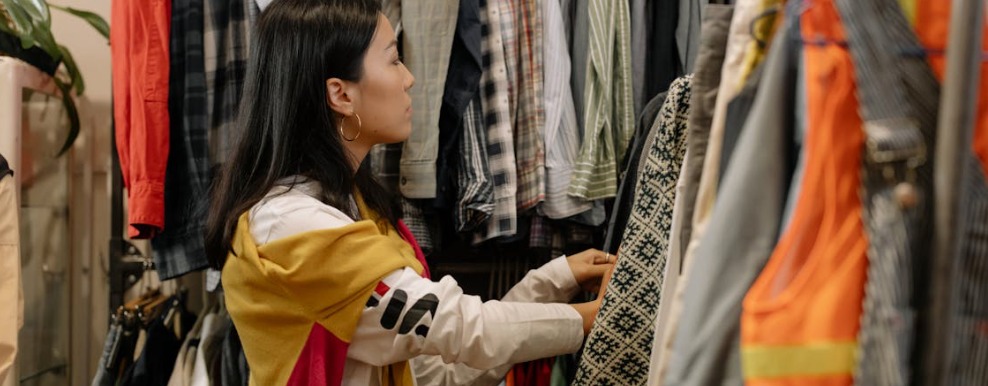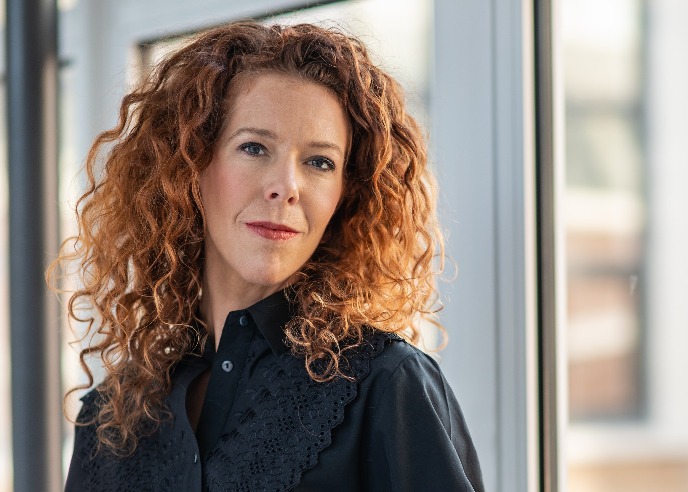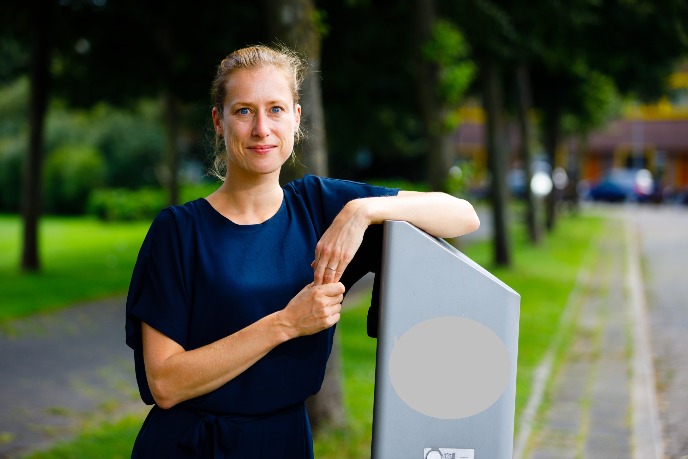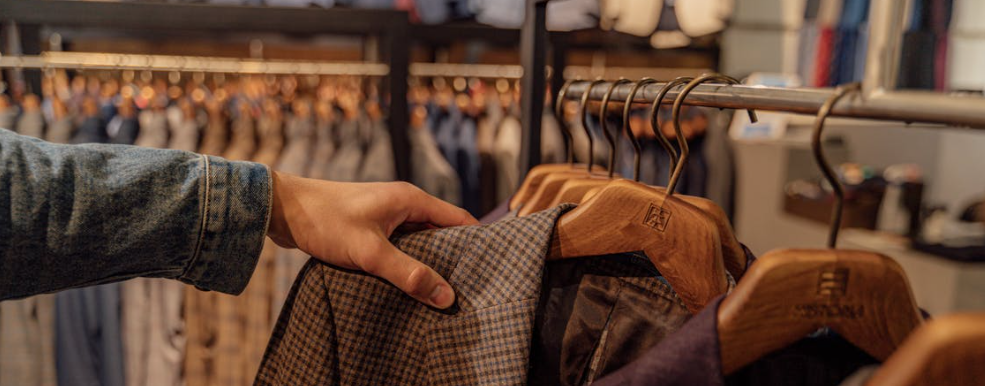From Fast Fashion to Green Fashion. 'We raise children as shoppers, who don't value textiles at all.' |Interview with Kim Poldner and Ellen van der Werff

The European Researchers' Night , a science festival with mini-lectures, experiments, music and dance, returns to Groningen on Friday 27 September. In the run-up to the event, participating researchers give a sneak preview. Today, UG scientists Kim Poldner and Ellen van der Werff talk about ‘circular textiles’. Although the rise of ‘ultra-fast fashion’ is disturbing, the two researchers also see great opportunities, for example in the field of digital fashion.
Kim Poldner and Ellen van der WerffProf. dr. Kim Poldner has been Endowed Professor of Regional and Circular Economic Development at the University of Groningen since January 2024. The appointment is a collaboration between the Faculty of Spatial Sciences, FEB and the three Northern provinces. She also works as a professor in Circular Business at The Hague University of Applied Sciences. Prof. dr. Ellen van der Werff is Associate Professor in the psychology of environment-friendly behaviour change at the Faculty of Behavioural and Social Sciences (BSS) at the University of Groningen. |
Text: Jelle Posthuma
According to Poldner, there are an incredible number of initiatives in the field of circular textiles. 'Twenty years ago, sustainable clothing was really niche. Now it has become much more mainstream: there are platforms like Vinted for second-hand clothes as well as more awareness among consumers.’
Companies and governments are also making significant strides, the researcher continues. ‘Large firms such as Nike and H&M have embarked on it, partly under pressure but also of their own accord.’ Until now, sustainability has been a ‘nice to have’ for fashion companies; with regulation, it should become a ‘need to have’, she continues. ‘For me, things are not moving fast enough yet, but they are definitely better than ten years ago.’
The government was long absent from the sustainable clothing arena, Poldner knows. However, things are now catching up. 'Over the past three years, you can see that, for example, at the Dutch Ministry of Infrastructure and Water Management and at the European level with the Green Deal. My hope is that we will reach a tipping point.'

Perverse incentives
Although there are plenty of positive developments, the transition to a circular economy is stalling. ‘Not because we are less innovative, but because we are consuming much more.’ Among other things, Poldner points to new ‘perverse incentives’. Online fast fashion businesses, also known as ‘ultra-fast fashion’, have been booming in recent years. Young audiences in particular are susceptible to the hawkish campaigns of online retailers such as Shein and Temu.
‘These major e-commerce platforms use marketing techniques that were not there 20 years ago, enticing children in particular to buy more. On the one hand, there are very nice developments in innovation related to circular textiles. On the other hand, the ‘dark forces’ have increased exponentially.' Nevertheless, Poldner is not discouraged by it: ‘I think we will eventually get the sustainable transition done.’

Environmental identity
Many consumers now know that buying fast fashion is bad for the environment, Poldner argues. However, it does not directly lead to greener actions. Ellen van der Werff looks at what motivates people to act sustainably and how we can devise interventions to change this behaviour. ‘Research shows that mere information, for example a warning about the environmental impact of certain clothes, hardly has any effect on people's behaviour,’ says van der Werff.
According to the researcher, it is important to look at behaviour where a lot of change is possible. 'Renting clothes instead of buying them is likely to deliver big environmental gains, but few people are willing to do so, research shows. This behaviour is therefore difficult to change. For buying sustainable materials, for example, there is much more willingness.' It is wise to focus on behaviours that people want to do, but are not yet doing. ‘This is the low-hanging fruit.’
People's environmental identity can be a route to changing behaviour, Van der Werff continues. This identity is the extent to which people see themselves as environmentally friendly. The stronger this eco-friendly identity, the more sustainably we behave. Moreover, this identity can act as a catalyst. When people are made aware of their own sustainable behaviour, such as cycling and waste sorting, they are more willing to live more sustainably. However, it also works the other way. ‘By emphasising that people are acting in an environmentally unfriendly way when it comes to clothing, their identity and behaviour becomes less sustainable.’
Van der Werff sees opportunities for positive affirmation in fashion. ‘Clothing is very visible: it tells something about your identity.’ The influence of others also plays a big role here, the researcher knows. She points to the ‘block leader approach’, in which a neighbourhood leader encourages others to behave sustainably. 'You could translate this approach to the digital world, where influencers play a big role. They can act as sustainable leaders and promote sustainable behaviour.’

Clothing value(s)
Poldner advocates a ‘Bob campaign’ for sustainable textiles, similar to the Dutch anti-alcohol ads. ‘Now we raise children as shoppers, who attach absolutely no value to textiles, and its production.’ At the heart of the circular economy is assigning value to a product, she says. ‘Are you involved with the people who made your T-shirt, and how do you treat a purchased product? These kinds of questions are key.’
According to Poldner, education has an important role to play. ‘In the past, many people were able to repair or make clothes. As far as I am concerned, we reintroduce these domestic skills as part of the curriculum.’ In addition, there is a lot to be gained in the digital field, she continues. ‘My 14-year-old son cares little about how he looks wearing his hoodie and sweatpants, but he spends a bag of money on his avatar in Roblox, a popular gaming platform. ‘Digital fashion is an interesting opportunity to give young people a sense of self-expression with only one-tenth of the footprint.’
Van der Werff stresses that it is not only about consumer behaviour. 'An individual's influence goes much further. You can swap clothes instead of buying them, boycott certain shops, or vote for a sustainable party. By doing so, you can change the system.’ Moreover, there is another remarkable option to change behaviour. Research shows that people are strongly influenced by their physical environment when making sustainable choices, Van der Werff explains. As such, providing clothing stores with a ‘green environment’ is a viable idea.
In a green clothing store, the salesperson also has an important role to play, the researcher knows. 'It's not just about the end user, but also the intermediary. With the energy transition, the heating expert might say: maybe it's time for a heat pump.’ A salesperson in a clothing shop could also take on this expert role. ‘The salesperson will not only tell you what suits you but also suggest sustainable options.’ In this way, salespeople also serve as ‘influencers’ to promote more sustainable fashion, Poldner adds.
European Researchers' NightThe four Schools for Science and Society of the University of Groningen, together with Forum Groningen and other partners, will be hosting the European Researchers' Night on Friday evening 27 September. It will be a vibrant science festival with over 40 programme elements. Stadjers, Ommelanders, students, non-students, researchers or non-researchers: all curious people are welcome. Tickets are still available. The European Researchers' Night (ERN) is an annual festival on the last Friday of September in several European cities, aiming to bring science to a wide audience. European Researchers' Night is co-funded by the European Commission, under the Horizon Europe Research and Innovation Programme, grant agreement No.101162172.
|
| Last modified: | 18 September 2024 10.09 a.m. |
More news
-
24 March 2025
UG 28th in World's Most International Universities 2025 rankings
The University of Groningen has been ranked 28th in the World's Most International Universities 2025 by Times Higher Education. With this, the UG leaves behind institutions such as MIT and Harvard. The 28th place marks an increase of five places: in...
-
05 March 2025
Women in Science
The UG celebrates International Women’s Day with a special photo series: Women in Science.
-
16 December 2024
Jouke de Vries: ‘The University will have to be flexible’
2024 was a festive year for the University of Groningen. In this podcast, Jouke de Vries, the chair of the Executive Board, looks back.


